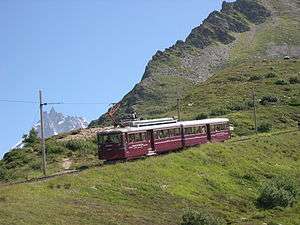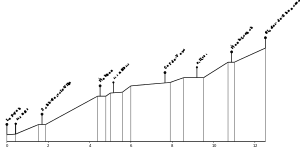Mont Blanc Tramway
The Mont Blanc Tramway or Tramway du Mont-Blanc (TMB) is a mountain railway line in the Haute-Savoie department of France. It is the highest in France and the fourth highest in Europe.
| Mont Blanc Tramway | |
|---|---|
 A train of the Mont-Blanc Tramway | |
| Overview | |
| Type | Tramway/Rack railway |
| Termini | Gare de Saint-Gervais-les-Bains-Le Fayet Nid d'Aigle |
| Operation | |
| Opened | 1907 |
| Operator(s) | Compagnie du Mont-Blanc |
| Technical | |
| Line length | 12.4 km (7.7 mi) |
| Number of tracks | 1 |
| Track gauge | 1,000 mm (3 ft 3 3⁄8 in) |
| Electrification | 11 kV 50 Hz AC |
| Highest elevation | 2,372 m (7,782 ft) asl |
| Maximum incline | 24% |
| Rack system | Strub |
| TMB route diagram | ||||||||||||||||||||||||||||||||||||||||||||||||||||||||||||||||||||||||||||||||||||||||||
|---|---|---|---|---|---|---|---|---|---|---|---|---|---|---|---|---|---|---|---|---|---|---|---|---|---|---|---|---|---|---|---|---|---|---|---|---|---|---|---|---|---|---|---|---|---|---|---|---|---|---|---|---|---|---|---|---|---|---|---|---|---|---|---|---|---|---|---|---|---|---|---|---|---|---|---|---|---|---|---|---|---|---|---|---|---|---|---|---|---|---|
| ||||||||||||||||||||||||||||||||||||||||||||||||||||||||||||||||||||||||||||||||||||||||||
| ||||||||||||||||||||||||||||||||||||||||||||||||||||||||||||||||||||||||||||||||||||||||||

The extensive views of Mont Blanc and adjacent mountains of the Mont Blanc massif provided by the tramway make it popular with tourists. Also, mountaineers and hikers use the tramway because its stops provide the jumping off points for many trails, as well as giving access to the Refuge Nid d'Aigle close to the terminus of railway.[1] The normal alpine mountaineering route to climb Mont Blanc starts at the tramway's terminus, Nid d'Aigle, and proceeds either to an overnight stop at the Tête Rousse Hut, or at the higher Goûter Hut.[2][3]
Location
The line runs from a connection with the SNCF at Saint-Gervais-les-Bains Le Fayet station to the Nid d'Aigle station at the Bionnassay glacier at an altitude of 2,372 m (7,782 ft). The initial intention was for the line to reach the Aiguille du Goûter.
Technology
The line is 12.4 km (7.7 mi) long and has a rail gauge of 1,000 mm (3 ft 3 3⁄8 in). It is a rack and adhesion railway, using the Strub design to overcome a height difference of 1,792 m (5,879 ft). The line has an average gradient of 15% and a maximum gradient of 24%. Some 85% of the line is equipped with rack rail, with adhesion being used at the foot of the line and at intermediate crossing stations. The line is electrified using an overhead line at 11 kV and 50 Hz AC.
Operations
The line is operated by the Compagnie du Mont-Blanc which also manages the Montenvers Railway and many ski lifts in the Mont Blanc region. The first section of the line, to the Col de Voza, was opened in 1907. The line reached its current terminus in August 1914 when work was suspended, because of World War I, and never resumed. The line was worked by steam locomotives until it was electrified in 1956.
The line is worked by three motor coaches which are named Anne, Marie and Jeanne. These were the names of the three daughters of the line's owner at the time of electrification.
The journey time is 1 hour from Fayet to Bellvue with four or five trips operating per day.
The Mont Blanc Tramway is featured in the film Malabar Princess.
In late July 2010 the last section of the Tramway and the nearby Nid d'Aigle mountain refuge was closed for safety reasons for the rest of the operational season. This was due to concerns of a repeat of a potentially catastrophic flood from release of a vast quantity of water that had built up within an intraglacial pocket within the Tête Rousse glacier lying directly above it.[4]
Gallery
- Terminus at Saint-Gervais-Le-Fayet (1)
 Terminus at Saint-Gervais-Le-Fayet (2)
Terminus at Saint-Gervais-Le-Fayet (2)- Snow blower
- Saint-Gervais-Ville station
See also
References
- "Nid d'Aigle Refuge (2372m), Massif du Mont-Blanc". www.chamonet.com. Retrieved 23 February 2016.
- SummitPost Tête Rousse Hut. Retrieved 17 August 2009.
- "Refuge de l'Aiguille du Goûter". www.camptocamp.org. Retrieved 23 February 2016.
- "Catastrophes, avalanches, poches d'eau". www.glaciers-climat.fr. Retrieved 23 February 2016.
- Web page https://web.archive.org/web/20060714093545/http://www.compagniedumontblanc.fr/en/tramway/index.html and descendants, retrieved on 15 March 2004 at 17:15 UTC.
External links
| Wikimedia Commons has media related to Tramway du Mont-Blanc. |



